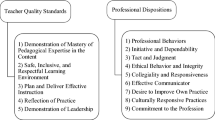Abstract
Professional development systems for early childhood teachers will be effective only if they participate in its construction. Currently, teachers are not participating in the development of such a system. This article uses contextual theory to examine reasons why current early childhood teachers may not be embracing and guiding the creation of a viable model of professional development. Using Bronfenbrenner's ecological model and examining micro, meso, exo, macro, and chrono level issues illuminates the barriers to teacher participation in and access to professional development systems. Examples of mechanisms to address these barriers are also examined.
Similar content being viewed by others
References
Arnett, J. (1989). Caregivers in day care centers; does training matter?Journal of Applied Developmental Psychology, 10, 541–552.
Belenky, M.F., Clinchy, B.M., Goldberger, N.R., & Tarule, J.M. (1986).Women's ways of knowing: The development of self, voice, and mind. Basic Books, Inc.
Berk, L. (1985). Relationships of educational attainment, child-oriented attitudes, job satisfaction, and career commitment to caregiver behavior towards children.Child Care Quarterly, 14, 103–129.
Bronfenbrenner, U. (1979).The ecology of human development. Cambridge: Harvard University Press.
Bronfenbrenner, U. (1989). Ecological systems theory. In R. Vasta (Ed.),Annals of child development, vol. 6 (pp. 187–249). Greenwich, CT: JAI Press.
Bronfenbrenner, U. (1993). The ecology of cognitive development: Research models and fugitive findings. In R. Wozniak & K. Fischer (Eds.),Development in context (pp. 3–43). Hillsdale, NJ: Erlbaum.
Child Care Action Campaign. (1988).Child Care: The Bottom Line. New York: Child Care Action Campaign.
Davies, M. (1993, March).Child care women and work: A gender analysis of the devaluation of the work of caring for children. Paper presented at the meeting of the Society for Research in Child Development, New Orleans, LA.
Dresden, J., & Myers, B. (1989). Early childhood professionals: Toward self-definition.Young Children, 44(2), 62–66.
Elder, G. & Caspi, A. (1990). Studying lives in a changing society: Sociological and personalogical explanations. In A.I. Rabin, R.A. Zucker, & S. Frank (Eds.),Studying persons and lives (pp. 201–247). New York: Springer.
Finkelstein, B. (1988). The revolt against selfishness: Women and the dilemmas of professionalism in early childhood education. In B. Spodek, O. Saracho, & D. Peters (Eds.),Professionalism and the early childhood practitioner. New York: Teachers College Press.
Galinsky, E., & Stein, P. (1990). The impact of human resource policies on employees.Journal of Family Issues, 11, 368–383.
Kerchner, C., & Koppich, J. (1993).A union of professionals: Labor relations and educational reform. New York: Teachers College Press.
Lather, P. (1986). Research as praxis.Harvard Educational Review, 56(3) 257–277.
Morgan, G., Azer, S., Costley, J., Genser, A., Goodman, I., Lombardi, J., McGimsey, B. (1993).Findings and data from making a career of it. The state of the states report on career development in early care and education. Boston, MA: Wheelock College, the center for career development in early care and education.
NAEYC. (1991). A vision for early childhood professional development.Young Children, 47(1), 35–37.
National Black Child Development Institute. (1994). Constraints and opportunities for African American leadership in early childhood education.Young Children, 49(4), 32–36.
Nelson, M. (1990). Mothering others' children: The experiences of family day care providers.Signs, 15, 586–605.
Whitebook, M., Howes, C., & Phillips, D. (1989).Who cares? Child care teachers and the quality of care in America. Final Report of the National Child Care Staffing Study. Oakland, CA: Child Care Employee Project.
Zigler, E. & Muenchow, S. (1992).Head Start: The inside story of America's most successful educational experiment. New York: HarperCollins Publishers, Inc.
Author information
Authors and Affiliations
Rights and permissions
About this article
Cite this article
Cassidy, D.J., Vardell, R. & Buell, M.J. If you don't know where you are, how can you get where you're going?: A contextual examination of professional development in the early childhood field. Child Youth Care Forum 24, 151–168 (1995). https://doi.org/10.1007/BF02128541
Issue Date:
DOI: https://doi.org/10.1007/BF02128541




